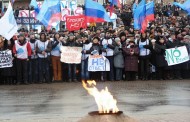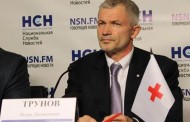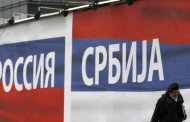Russia has abandoned the troubled South Stream project and will now be building its replacement with Turkey. This monumental decision signals that Ankara has made its choice to reject Euro-Atlanticsm and embrace Eurasian integration.
In what may possibly be the biggest move towards multipolarity thus far, the ultimate Eurasian pivot, Turkey, has done away with its former Euro-Atlantic ambitions. A year ago, none of this would have been foreseeable, but the absolute failure of the US’ Mideast policy and the EU’s energy one made this stunning reversal possible in under a year. Turkey is still anticipated to have some privileged relations with the West, but the entire nature of the relationship has forever changed as the country officially engages in pragmatic multipolarity.
Turkey’s leadership made a major move by sealing such a colossal deal with Russia in such a sensitive political environment, and the old friendship can never be restored (nor do the Turks want it to be). The reverberations are truly global.
Missing The Signs
It’s amazing how much the West lost in such a short period of time and due to such major and totally unnecessary political miscalculations, and they owe their roots to the disastrous regime change operations in Syria and Ukraine.
The US In The Mideast:
Nearly four years ago, the US co-opted Turkey to ‘Lead From Behind’ in overthrowing the democratically elected Syrian government. However, things didn’t go as quite as planned and the Syrian people engaged in a fierce Patriotic War to defend the existence of their secular state. Turkey purposely sat out on the anti-ISIL coalition because it wanted solid guarantees of its reward in a regime-changed Syria, but none were forthcoming. Its leadership held firm, so the US started playing the ‘Kurdish Card’ of ethnic nationalism to bully them into submitting – which eventually backfired. The US crossed the line by arming and training the Kurds (some of whom are registered as terrorists by Turkey), and faced with such an existential threat to their state (that would either be unleashed wittingly or unwittingly with time), they knew they had to pivot, and fast.
The EU And Its Energy Policy:
Meanwhile, the EU totally fudged its energy policy with Russia. As a result of the Ukraine Crisis, it began exerting tremendous pressure (which was already building up) on the South Stream project, calling upon EU energy legislation clauses to state that its member states’ cooperation with Russia was illegal. Poorer countries like Bulgaria pleaded for the EU to allow the project, emphasizing how important it was for their national economies (which haven’t received much of Brussels’ largesse since joining), but to no avail, as the EU stonewalled the project. Russia had no choice but to find a replacement route and saw that the only viable stand-in was Turkey, which just so happened to be undergoing its most serious crisis ever with the US.
Ducks In A Row
Let’s look at how this geostrategic masterpiece was set into motion, as the past two months contain the main moves of this political waltz — and they’re all centered on Russian President Putin.
(1) Serbia:
Putin’s October visit to Serbia served to inform his counterpart about the plans to scrap South Stream, while still giving him strong assurances that the Russian-Serbian relationship will remain intact going forward, with or without the gas project.
(2) Syria and Sochi:
Syrian Foreign Minister Walid Muallem visited Sochi last week and personally met with Putin and Foreign Minister Lavrov. The meeting, held behind closed doors, was highlighted for the attention that the Russian leader gave to his guest. Putin could have told him to tell President Assad about his upcoming visit to Turkey in order to reassure his loyal and respected partner of his positive intentions and the bigger picture surrounding his motives.
(3) Turkey:
The final step was for Putin to go to Turkey and make the announcement after his meeting with Erdogan. Turkey understands that it has made a definitive move by joining the project and that there is no going back from this decision. It had been rejected by the EU for decades and it now realizes that its closest military ally, the US, had played it for a fool during the entire Syrian War.
Worse still, the Kurdish Card has gotten out of control, and it seems inevitable that sooner or later the insurrection will be rekindled, and with bloody and destabilizing consequences. On a pragmatic note, global events are shifting from the West to the non-West (read: BRICS and G20), so in the national self-interests of the Turkish state, it’s seen as wise to join the new winner’s circle (after being rejected by Europe and betrayed by the US) and try to turn over a new leaf with new friends.
The Aftershocks
The announcement of the New South Stream has global implications, but here’s just a few of them as arranged by region:
Europe:
The EU will now have to pay for expensive LNG (on average 30% higher) that will likely be sold from the terminal at the Greek-Turkish border as well as remain energy dependent on risky Ukrainian routes. But there’s a catch – the poor Balkan countries are able to get in on the deal by building relatively cheaper overland connecting lines and resurrect the project…but only if they leave the EU and its authoritative energy legislation. All that it takes is for Greece or Bulgaria to abandon Brussels (which doesn’t seem improbable), and the project can either go through Macedonia en route to Serbia or via Bulgaria as initially planned, then up to the Hungarian border. At this point, it’s certainly a tantalizing thought for the countries that have paid the most for their ‘integration’ and received scarcely anything in return. Expect the New South Stream to politically divide the EU like never before.
Mideast:
There is no way that Russia would have sold Syria out after so many years of friendship, especially after Putin’s high-profile meeting with Muallem. Thus, Turkey is not forecast to directly invade Syria (although it could continue training some anti-government fighters). It may, however, allow the US to use its airbases and airspace to carry out airstrikes on ISIL.
Since it’s now behaving in a multipolar fashion, Turkey is playing all sides to its advantage, so it will still retain a defense relationship with NATO and the US, but it will no longer behave as an absolute lackey. Taking things further, Turkey’s shift to the East might allow Iran to one day build pipelines through it to access the Western market, and it could also allow Turkmen gas to transit both countries en route to Europe.
Eurasia:
Most significantly, Turkey has shown that it has the political grit to make historical decisions independent of NATO, showing that it is embracing its pivotal geography and combining it with a multipolar policy. The Shanghai Cooperation Organization (importantly encompassing Russia and China) just outlined the specific procedures for admitting new members a few months ago, although at the time analysts thought this was directed towards India and Pakistan.
Now, however, with Turkey already being a dialogue partner, it might make the rapid step to observer status and full-fledged membership just as quickly as it made its decisive pivot. There’s also been talk of the country entering into a free-trade agreement with the Russian-led Eurasian Customs Union, so it might incidentally find its EU replacement with Brussels’ eastern adversary, Moscow.
As Western decision makers are scratching their heads and wondering how it ever got to this point, they’d do well to remember that none of this would have happened had they just allowed the Syrian and Ukrainian people to live in peace with their democratically elected governments.
Andrew Korybko





Recent Comments
Daniel in: Russia may ban fruit imports from Serbia: RIA
Great news Russian Brothers! Serbia and the Serbs are occuoied by our ...
Randolph Kraus in: The meeting of the heads of the FAM of countries of Norman Four has not been planned
what can they accomplish while the us is supplying hardware? ...
NRP in: Spotkanie "normandzkiej czwórki"odwołane
Czy wiadomo dlaczego spotkanie nie dojdzie so skutku? ...
NRP in: Ukraińcy w Polsce
Straszna tragedia dla narodu Ukrainy. Dobrze, że młodzi ludzie nie chc ...
NRP in: Polacy w Donbasie: Aleksandrówka
Często tu zaglądam i nie mogę się nadziwić, że nawet pod tekstami doty ...